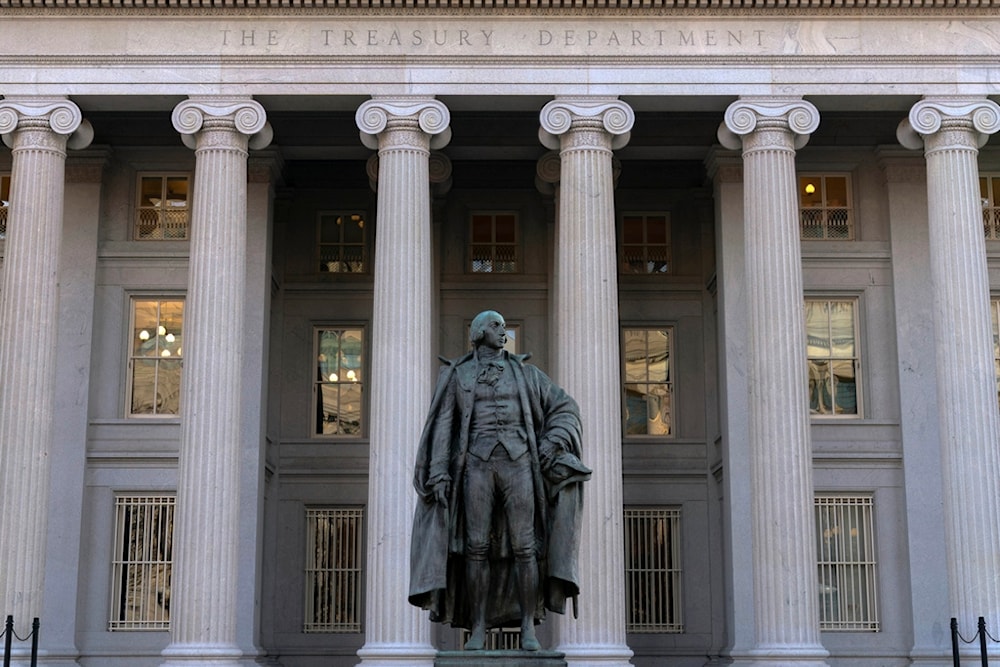US sanctions Iran-linked entities in fresh escalation on Tehran
Once again, the US Treasury Department uses the pretext of "Iranian weapons proliferators" to implement Trump's "maximum pressure" campaign on the Islamic Republic.
-
 The US Department of the Treasury building is seen in Washington, Monday, Nov. 18, 2024 (AP)
The US Department of the Treasury building is seen in Washington, Monday, Nov. 18, 2024 (AP)
The United States imposed new sanctions on Tuesday targeting individuals and entities in Iran, the United Arab Emirates, and China, accusing them of "involvement in an Iranian weapons procurement network."
The move is part of US President Donald Trump’s broader effort to increase pressure on Tehran.
The US Treasury Department, in coordination with the Department of Justice, announced sanctions on six entities and two individuals under the pretext of facilitating the procurement of unmanned aerial vehicle (UAV) components for a key Iranian drone manufacturer.
Treasury Secretary Scott Bessent stated, "Treasury will continue to disrupt Iran’s military-industrial complex and its proliferation of UAVs, missiles and conventional weapons that often end up in the hands of destabilizing actors, including terrorist proxies."
The sanctions targeted one entity and two individuals in Iran, one entity in China, and four entities in the UAE. Once again, the US Treasury Department uses the pretext of "Iranian weapons proliferators" to implement Trump's "maximum pressure" campaign on the Islamic Republic, aiming to drive Iranian oil exports to zero and prevent Tehran from advancing its nuclear capabilities, despite repeated assurances that they are peaceful.
The sanctions follow Trump’s February directive to intensify pressure on Iran, including sanctions on "violators".
On Sunday, Trump threatened Iran with bombing and secondary tariffs unless a deal is reached over its nuclear program.
Trump’s withdrawal from the 2015 nuclear deal, which had imposed limits on Iran’s uranium enrichment in exchange for sanctions relief, and the reimposition of US sanctions have led Iran to exceed those enrichment limits.
Western nations have raised concerns over Iran’s potential pursuit of nuclear weapons, although Tehran maintains its nuclear program is solely for civilian purposes.
Read more: Any hostility against Iran to prompt severe response: Sayyed Khamenei
Iran president rules out direct talks with US, says indirect ones open
On Sunday, Iranian President Masoud Pezeshkian stated that his country has ruled out direct negotiations with the United States in its response to a letter from the American president but has expressed openness to indirect talks.
Speaking at a cabinet meeting, Pezeshkian confirmed that Iran’s reply to the letter of US President Donald Trump was conveyed through Oman.
He emphasized that while Iran has rejected direct talks, it has never closed the door to indirect negotiations.
"As the Islamic Republic had never blocked the paths of indirect negotiations before, this letter (Iran’s reply) has also mentioned that the road to indirect negotiation is left open and has emphasized that Iran has never avoided negotiations,” he indicated.
The Iranian president attributed challenges in the negotiation process to the United States’ lack of commitment, stressing that past mistakes must be rectified and trust restored.
“This will be the manner of Americans that would determine the continuity of the course of negotiations,” Pezeshkian pointed out.
In a related context, Iranian government spokesperson Fatemeh Mohajerani confirmed that indirect negotiations with the US have been placed on the agenda.
Trump initially sent his letter to Iran on March 12 via the United Arab Emirates (UAE). While the content of the letter has not been officially disclosed, the US president has indicated that he proposed opening negotiations for a new nuclear agreement. Trump unilaterally withdrew the United States from a previous deal with Iran in 2018.
Iranian Foreign Minister Abbas Araghchi reiterated on Thursday that Iran remains open to indirect negotiations but will not engage in direct talks while subjected to the US' "maximum pressure" policy and military threats.
Last week, Araghchi said Trump's letter was "actually more of a threat" than an offer. Trump's letter reportedly set a two-month deadline for Iran to agree to a new nuclear deal or face potential military action.
Read more: Iran warns US, 'Israel': Any attack to compel nuclear bomb production

 4 Min Read
4 Min Read










